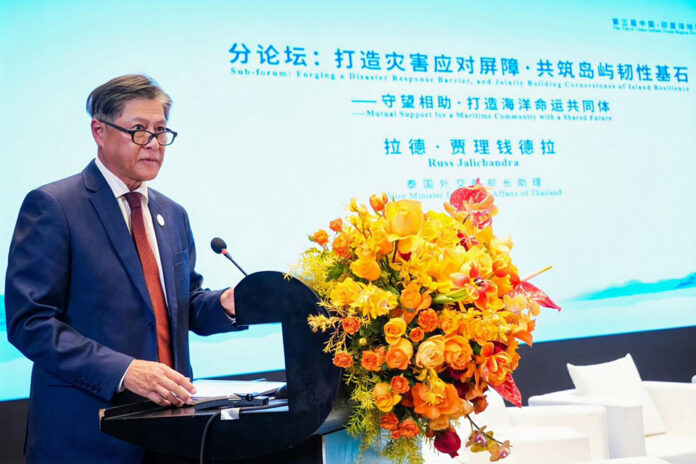Vice Minister Russ Jalichandra highlighted Thailand’s leadership in marine conservation at the China-Indian Ocean Region Forum, urging collaboration to advance Sustainable Development Goals through innovation and sustainable Blue Economy practices.
Thailand’s Leadership in Marine Conservation
At the 3rd China-Indian Ocean Region Forum on Blue Economy Development Cooperation held in Kunming from December 15-16, 2024, Vice Minister Russ Jalichandra emphasized Thailand’s significant role in marine conservation and the Blue Economy. In his keynote speech, he highlighted Thailand’s commitment to marine environmental conservation, particularly under the ASEAN Framework of Action on Marine Debris. He asserted Thailand’s leadership in this domain, urging for shared experiences and innovations to advance Sustainable Development Goals (SDGs) through sustainable marine practices.
Collaboration for Sustainable Development
Vice Minister Jalichandra called for collective efforts among stakeholders to enhance marine conservation. He encouraged collaborative initiatives as crucial for achieving the United Nations Sustainable Development Goals. The forum, co-hosted by international entities like the China International Development Cooperation Agency, provided a platform to explore sustainable practices in marine management. Jalichandra emphasized the importance of leveraging regional strengths to tackle environmental challenges. This call for cooperation underscores Thailand’s leadership in advancing marine conservation and promoting a sustainable Blue Economy.
At the 3rd China-Indian Ocean Forum, Thailand took a prominent stance in promoting the blue economy and boosting island resilience. As the world increasingly recognizes the urgent need for sustainable development and environmental conservation, Thailand is advocating for comprehensive strategies that address the unique challenges and opportunities presented by its maritime geography. By embracing the blue economy, Thailand aims to leverage its extensive coastal resources to foster economic growth while ensuring environmental sustainability.
Thailand’s strategic initiatives focus on sustainable fisheries, marine tourism, and the conservation of maritime ecosystems. Recognizing the vital role that healthy oceans play in economic and social development, Thailand is working to implement policies that prevent overfishing, protect coral reefs, and promote eco-friendly tourism practices. Such initiatives aim to ensure that marine resources are utilized in a manner that benefits both current and future generations, while also addressing climate change impacts.
The country’s commitment to island resilience is underscored by its efforts to strengthen the adaptive capacity of its coastal communities. With many Thai islands facing threats from rising sea levels, extreme weather events, and environmental degradation, enhancing resilience is crucial. To this end, Thailand is investing in infrastructure improvements, disaster risk reduction, and community education to better prepare for and respond to these challenges. By fostering collaboration between government bodies, local communities, and international organizations, Thailand seeks to develop resilient communities that can thrive amid the changing environmental landscape.
Thailand’s participation in the China-Indian Ocean Forum highlights the importance of regional cooperation in addressing shared maritime challenges. By collaborating with neighboring countries and stakeholders, Thailand is promoting the exchange of knowledge, technology, and best practices in sustainable marine management. This regional dialogue aims to create a cohesive framework that supports the implementation of the blue economy and resilience-building initiatives across the Indian Ocean rim, ensuring a sustainable and prosperous future for all participating nations.
Source : Thailand Promotes Blue Economy and Island Resilience at the 3rd China-Indian Ocean Forum


